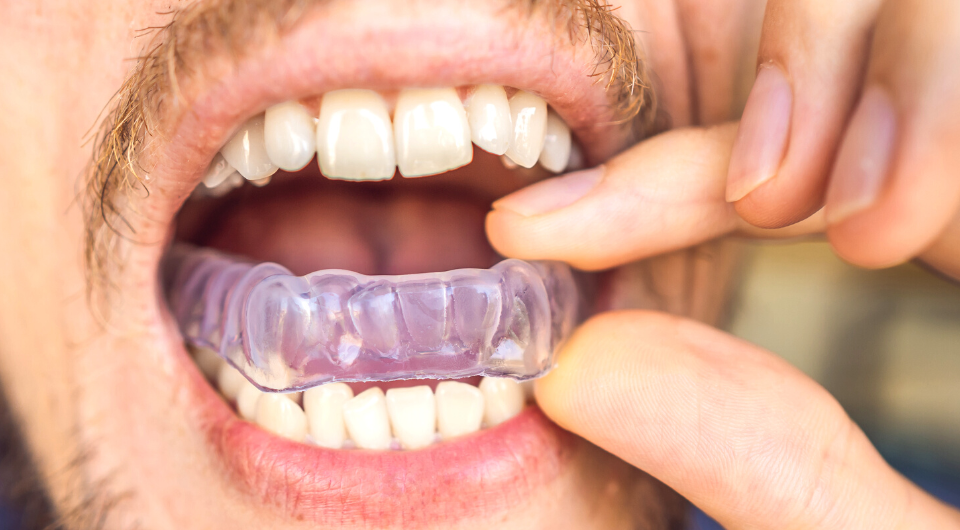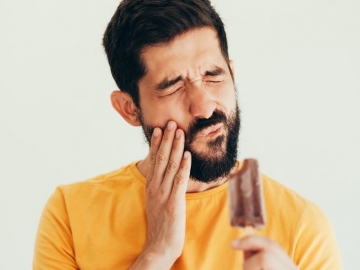
Posted on: 07 March, 2023
Dentists may prescribe you with a custom mouthguard or night splint for a variety of reasons.
3-minute read
Mouthguards help to protect teeth and jaws from serious injuries during contact sports and other recreational pastimes, but that isn't not their only function. Dentists may also recommend night splints and other types of mouthguards to help treat a range of conditions, from grinding to sleep disorders.
Here are 6 reasons why a dentist may recommend a mouthguard or splint for you or your child and why a custom-made mouthguard provided by your dentist can offer the best protection.

Anyone who plays contact sports that involve a risk of injury to the mouth should wear a mouthguard for protection. This includes activities such as:
If you or your child don't wear a mouthguard, you will be at higher risk of serious sporting injuries, such as:
Mouthguards have been found to be an effective measure for reducing sporting injuries to the mouth and jaw, which may be painful, disfiguring and expensive to treat. Many schools and sports clubs in Australia now operate a 'no mouthguard, no play' policy during games and training.
A sports mouthguard that has been custom made by a dentist to fit the precise contours of your teeth and gums offers more comfort and protection than a thin and poorly-fitting mouthguard bought from a store. Custom mouthguards can also be made for teeth with braces.

Although mouthguards may only be mandatory for certain contact sports, their use is also recommended when taking part in other sports or activities that may involve a risk of impacts to the mouth or face. These include (but are not limited to):
Whether it's impacts from balls and equipment, other players or falls, a mouthguard can lower your risk of being involved in a dental emergency.

Unconscious teeth grinding and clenching is known as bruxism. This may happen for various reasons, from psychological factors such as stress to physical factors such as worn teeth or an orthodontic issue affecting how your teeth bite together.
Many people grind their teeth during sleep, which can damage their teeth and strain their jaw. Dentists may provide a custom mouthguard known as a night splint to prevent contact between the upper and lower teeth and reduce pressure.
Bruxism mouthguards are made from harder plastic than sports mouthguards and may be provided for the lower teeth or upper teeth, depending on the individual case. While a mouthguard may relieve bruxism symptoms, other treatments will usually be necessary to address the root cause of teeth grinding habits.
Dentists may also recommend a night splint to help relieve ongoing symptoms of temporomandibular joint disorder (TMJD). These are the two joints on the sides of the head that connect the jaws and enable their movement.
If the TMJ joints are affected by a jaw injury, a joint condition such as arthritis, or pressure from teeth grinding or other causes, this can restrict jaw movements and cause pain or other symptoms. Wearing a night splint may relieve pressure on the joints, but will not permanently treat the condition.

Obstructive sleep apnoea (OSA) is a chronic sleep disorder that happens when the airways close and breathing is interrupted during sleep. OSA can cause loud snoring and affect sleep quality, leading to fatigue and increasing associated health risks.
A custom mouthguard known as a mandibular advancement device (MAD) may be recommended to help alleviate symptoms in mild to moderate cases of obstructive sleep apnoea. This device moves the lower jaw forwards to hold the airway open during sleep, helping the wearer to breathe easier without interruptions.

If you're having dental veneers to enhance the appearance of your teeth or dental implants to replace missing or damaged teeth, your dentist may sometimes suggest wearing a night guard for the short or long term after their placement. This is to protect restored and prosthetic teeth from damage resulting from teeth grinding.
A night guard is most often recommended when veneers or dental implants are placed in both the upper and lower aches, as this may affect your bite and cause involuntary grinding.

If you need a sport mouthguard for yourself or your child, you might wonder what the difference is between mouthguards sold in stores and a custom mouthguard made by a dentist.
There are three main types of mouthguards:
While all mouthguards offer some level of protection, a mouthguard that has been designed precisely to fit your bite can absorb and spread impacts more evenly. The Australian Dental Association (ADA) recommends wearing a custom mouthguard during contact sports to reduce the risk of serious dental injuries.
A custom-made mouthguard can also feel more comfortable to wear, will have less impact on breathing and speech, and is less likely to move around in your mouth or come loose while playing. They can also be customised in team colours and should last for several seasons before they need to be replaced.
If you need a mouthguard for sport or to help with the treatment of bruxism, TMJ disorder or obstructive sleep apnoea, our experienced dentists at Mount Lawley Dental can provide custom-made mouthguards, splints and similar devices that are designed to be comfortable and effective.
To find out more or schedule an appointment with our dentists in Mount Lawley, call us today on (08) 9227 8777 or book online. We welcome patients from all nearby areas, including Highgate, Inglewood and North Perth.

Understanding Common Dental Problems: Tips for Prevention and Early Detection

Why Do I Have Sensitive Teeth

The Truth About Fluoride: Facts and Fiction